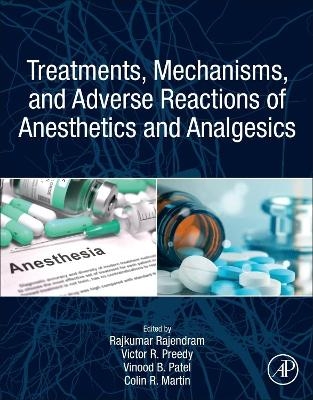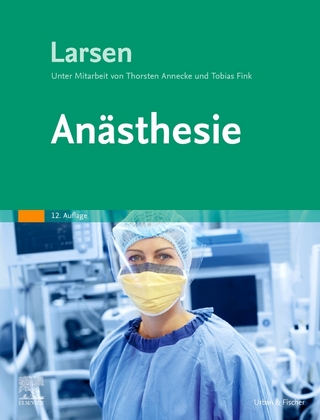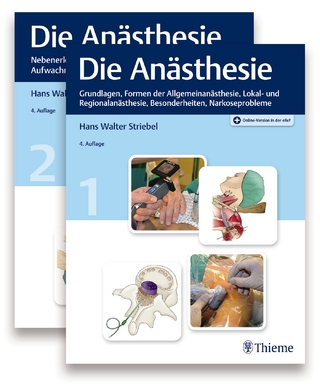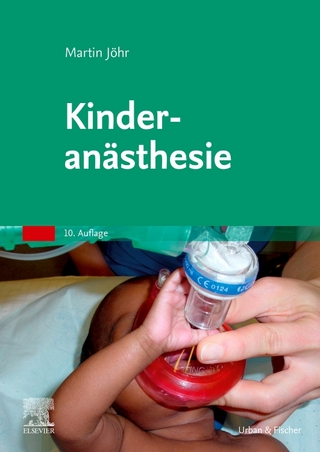
Treatments, Mechanisms, and Adverse Reactions of Anesthetics and Analgesics
Academic Press Inc (Verlag)
978-0-12-820237-1 (ISBN)
Dr Rajkumar Rajendram is a clinician scientist with a focus on internal medicine, anaesthesia, intensive care and peri-operative medicine. He graduated with distinctions from Guy’s, King’s and St. Thomas Medical School, King’s College London in 2001. As an undergraduate he was awarded several prizes, merits and distinctions in pre-clinical and clinical subjects. Dr Rajendram began his post-graduate medical training in general medicine and intensive care in Oxford. He attained membership of the Royal College of Physicians (MRCP) in 2004 and completed specialist training in acute and general medicine in Oxford in 2010. Dr Rajendram subsequently practiced as a Consultant in Acute General Medicine at the John Radcliffe Hospital, Oxford. Dr Rajendram also trained in anaesthesia and intensive care in London and was awarded a fellowship of the Royal College of Anaesthetists (FRCA) in 2009. He completed advanced training in regional anaesthesia and intensive care. He was awarded a fellowship of the Faculty of Intensive Care Medicine (FFICM) in 2013 and obtained the European diploma of intensive care medicine (EDIC) in 2014. He then moved to the Royal Free London Hospitals as a Consultant in Intensive Care, Anaesthesia and Peri-operative Medicine. He has been a fellow of the Royal College of Physicians of Edinburgh (FRCP Edin) and the Royal College of Physicians of London (FRCP Lond) since 2017 and 2019 respectively. He is currently a Consultant in Internal Medicine at King Abdulaziz Medical City, National Guard Heath Affairs, Riyadh, Saudi Arabia. Dr Rajendram’s focus on improving outcomes from Coronavirus Disease 2019 (COVID-19) has involved research on point of care ultrasound and phenotypes of COVID-19. Dr Rajendram also recognises that nutritional support is a fundamental aspect of medical care. This is particularly important for patients with COVID-19. As a clinician scientist he has therefore devoted significant time and effort into nutritional science research and education. He is an affiliated member of the Nutritional Sciences Research Division of King’s College London and has published over 400 textbook chapters, review articles, peer-reviewed papers and abstracts. Victor R. Preedy BSc, PhD, DSc, FRSB, FRSPH, FRSC, FRCPath graduated with an Honours Degree in Biology and Physiology with Pharmacology. After gaining his University of London PhD, he received his Membership of the Royal College of Pathologists. He was later awarded his second doctorate (DSc), for his contribution to protein metabolism in health and disease. He is Professor of Clinical Biochemistry (Hon) at King’s College Hospital and Emeritus Professor of Nutritional Biochemistry at King’s College London. He has Honorary Professorships at the University of Hull, and the University of Suffolk. Professor Preedy was the Founding Director and then long-term Director of the Genomics Centre at King’s College London from 2006 to 2020. Professor Preedy has been awarded fellowships of the Royal Society of Biology, the Royal College of Pathologists, the Royal Society for the Promotion of Health, the Royal Institute of Public Health, the Royal Society for Public Health, the Royal Society of Chemistry and the Royal Society of Medicine. He carried out research when attached to the National Heart Hospital (part of Imperial College London), The School of Pharmacy (now part of University College London) and the MRC Centre at Northwick Park Hospital. He has collaborated with international research groups in Finland, Japan, Australia, USA, and Germany. To his credit, Professor Preedy has published over 750 articles, which includes peer-reviewed manuscripts based on original research, abstracts and symposium presentations, reviews and edited books. Vinood B. Patel, BSc, PhD, FRSC, is currently Professor in Clinical Biochemistry at the University of Westminster. In 2014 Dr Patel was elected as a Fellow to The Royal Society of Chemistry. Dr Patel graduated from the University of Portsmouth with a degree in Pharmacology and completed his PhD in protein metabolism from King’s College London in 1997. His postdoctoral work was carried out at Wake Forest University Baptist Medical School, NC, USA studying structural-functional alterations to mitochondrial ribosomes, where he developed novel techniques to characterize their biophysical properties. Research is being undertaken to study the role of nutrients, antioxidants, phytochemicals, iron, alcohol and fatty acids in the pathophysiology of liver disease. Other areas of interest are identifying new biomarkers that can be used for the diagnosis and prognosis of disease and understanding mitochondrial oxidative stress in neurological disorders and iron dysregulation in diabetes. Dr Patel is a nationally and internationally recognized researcher and has several edited biomedical books related to the use or investigation of active agents or components. These books include The Handbook of Nutrition, Diet, and Epigenetics, Branched Chain Amino Acids in Clinical Nutrition, Cancer: Oxidative Stress and Dietary Antioxidants, Toxicology: Oxidative Stress and Dietary Antioxidants, Molecular Nutrition: Vitamins, The Neuroscience of Pain, Cognitive Behavioural Therapy. He is Editor of the ten-volume series Biomarkers in Disease: Methods, Discoveries and Applications. Colin R. Martin RN, BSc, MSc, PhD, MBA, YCAP, FHEA, C.Psychol, AFBPsS, C.Sci is Professor of Clinical Psychobiology and Applied Psychoneuroimmunology and Clinical Director of the Institute of Health and Wellbeing at the University of Suffolk, UK. He is a Chartered Health Psychologist and a Chartered Scientist. He also trained in analytical biochemistry, this aspect reflecting the psychobiological focus of much of his research within mental health. He has published or has in press well over 300 research papers and book chapters. He is a keen book author and editor having written and/or edited more than 50 books. These outputs include the prophetic insight into the treatment of neurological disease, Handbook of Behavior, Food and Nutrition (2011), Nanomedicine and the Nervous System (2012), Oxidative Stress and Dietary Antioxidants in Neurological Disease (2020), Zika Virus Impact, Diagnosis, Control and Models (2021), Factors Affecting Neurodevelopment: Genetics, Neurology, Behavior and Diet (2021), Diagnosis and Treatment of Spinal Cord Injury (2022), The Neurobiology, Physiology, and Psychology of Pain (2022) and The Handbook of Lifespan Cognitive Behavioral Therapy: Childhood, Adolescence, Pregnancy, Adulthood, and Aging (2023). Professor Martin is particularly interested in all aspects of the relationship between underlying physiological substrates and behavior, particularly in how these relationships manifest in both acute and chronic psychiatric disorder. He has published original research germane to significant mental health disorders including the areas of schizophrenia, anxiety, depression, self-esteem, alcohol and drug dependency, high secure forensic mental health and personality disorder. He has a keen interest in the impact of postviral illness and is actively involved in clinical research post-Covid pandemic and in particular, the impact of Long Covid on psychological, neurological, physiological and social functioning. He is involved in collaborative International research with many European and Non-European countries.
I. Drugs and agents used in anesthesia and analgesia 1. Anesthesia for malignant hyperthermia susceptible patients 2. Use of dextran in regional anesthesia 3. Intraperitoneal local anesthetic agents in the management of post-operative pain 4. Automatic control of anesthesia via different vital signs 5. Non-opioid based analgesia in otolaryngology
II. Mechanisms of action of drugs 6. Buprenorphine: mechanisms and applications 7. Caffeine usage in pain management 8. Chloroprocaine: features and applications 9. Clonidine: features and applications 10. An excursion into secondary pharmacology of fentanyls with potential implications for drug design: σ1 receptor 11. Isoflurane: mechanisms and applications 12. The lidocaine patch: features and applications: post-thoracotomy pain and beyond 13. Memantine: features and application to chronic pain control 14. Midazolam: Perioperative administration 15. Intravenous paracetamol: features and applications 16. Prilocaine: mechanisms and applications 17. Sevoflurane: features and use in topical application for wound care 18. Tramadol as an analgesic
III. Adverse effects, reactions and outcomes 19. Long-term effects of anaesthesia on the brain: an update on neurotoxicity 20. Neuraxial labour analgesia and breast feeding 21. Mechanistic Overview of How Opioid Analgesics Promote Constipation 22. Cognitive-behavioral therapy for opioid use disorder and chronic pain 23. Preoperative opioid and benzodiazepines: impact on adverse outcomes 24. Anesthetics, Malignant hyperthermia syndrome and Kv7 channels 25. Problems with epidural catheter 26. Headache after neuroaxial blocks: a focus on combined-epidural anesthesia 27. Liposomal bupivacaine, pain relief and adverse events 28. Adverse events associate with analgesics: a focus on paracetamol use
IV. Novel and non-pharmacological aspects and treatments 29. Acronychia pedunculata leaves and usage in pain 30. Adansonia digitata and use in neuropathic pain: prostaglandins and beyond 31. Andrographis paniculata standardized extract (ParActin) and pain 32. Capsaicin: features usage in diabetic neuropathic pain 33. Cola nitida and Pain reliefLawrence 34. Analgesic effects of Ephedra Herb extract and ephedrine alkaloids-free Ephedra Herb extract (EFE) 35. Euphorbia bicolor (Euphorbiaceae) Latex Phytochemicals and applications to analgesia 36. Pain relieving activity of muntingia calabura l.: elucidation of possible mechanisms of action and identification of responsible phytoconstituents 37. Resolving neuroinflammation and pain with Maresin 1, a specialized pro-resolving lipid mediator 38. Therapeutic role of naringenin to alleviate inflammatory pain 39. Analgesic properties of Solanum paniculatum and S.torvum extracts 40. Dietary constituents contribute to local anesthetic agent: neurophysiologicals mechanism of nociceptive pain 41. Pain response following prenatal stress and its modulation by antioxidants 42. Physical activity and fitness in the prevention of musculoskeletal pain in youth 43. Linking aerobic exercise and childhood pain alleviation: a narrative 44. Physical activity and exercise in the management of musculoskeletal pain: a focus on fibromyalgia 45. Spinal cord stimulation and limb pain 46. Effectiveness of neural mobilization on pain and disability in individuals with musculoskeletal disorders 47. Virtual reality and applications to treating neck pain 48. Virtual reality-induced analgesia and dental pain 49. Vibrotactile devices, DentalVibe and local anesthesiaElitsa 50. Cooled radiofrequency ablation (CRFA) and osteoarthritis treatment for pain 51. Non-pharmacologic analgesic therapies: a focus on photobiomodulation, acustimulation and cryoanalgesia (ice) therapy 52. New coping strategies and self-education for chronic pain management: e-health 53. Postoperative Pain Management Truncal blocks in obstetric and gynecologic surgery
| Erscheinungsdatum | 14.12.2021 |
|---|---|
| Zusatzinfo | Approx. 250 illustrations; Illustrations |
| Verlagsort | San Diego |
| Sprache | englisch |
| Maße | 216 x 276 mm |
| Gewicht | 1860 g |
| Themenwelt | Medizin / Pharmazie ► Medizinische Fachgebiete ► Anästhesie |
| Naturwissenschaften ► Biologie ► Humanbiologie | |
| Naturwissenschaften ► Biologie ► Zoologie | |
| ISBN-10 | 0-12-820237-8 / 0128202378 |
| ISBN-13 | 978-0-12-820237-1 / 9780128202371 |
| Zustand | Neuware |
| Informationen gemäß Produktsicherheitsverordnung (GPSR) | |
| Haben Sie eine Frage zum Produkt? |
aus dem Bereich


